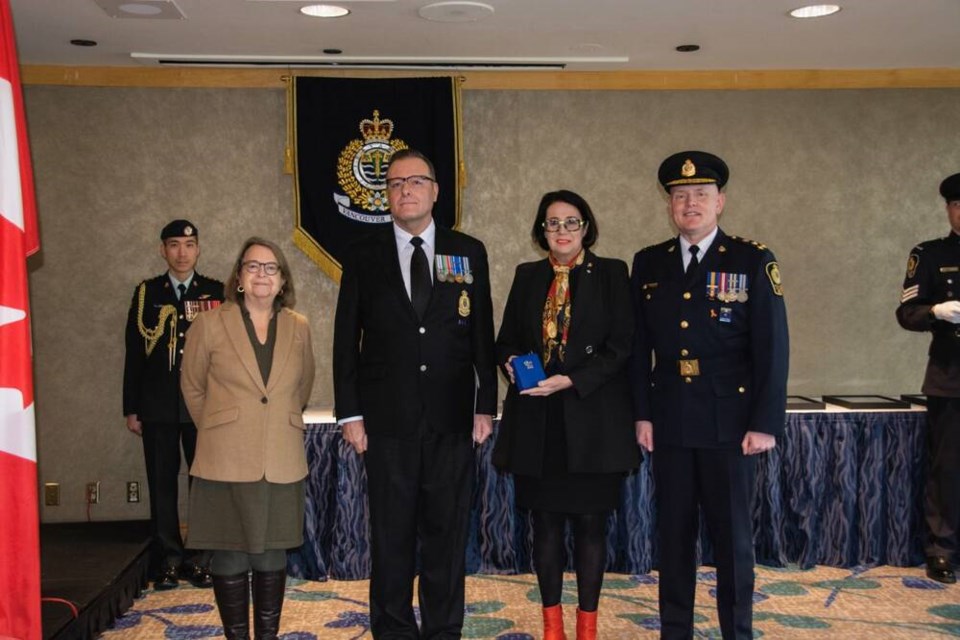Const. Ryan Prox hadn’t always craved a career in the police force – in fact as a youth he dreamed of being a pilot – but now in his 50s looking back on a remarkable career, and with a selection of awards under his belt, the officer is certainly grateful fate had other plans.
On Nov. 29 Prox was presented with the Officer of the Order of Merit of Police Forces, the second highest order that can be bestowed after the Order of Canada, and, at the same ceremony, was awarded the Police Exemplary Service Medal. As only one of 218 individuals invested as an Officer of the Order of Merit, in comparison to 7,212 who have received the Order of Canada, Prox has bagged an achievement few others get to experience.
“It’s really quite touching to be honoured with this,” said Prox, who was raised in North Vancouver and now lives in Deep Cove.
“It’s a reminder that I suppose I have accomplished quite a lot.”
Accomplishing ‘quite a lot’ is putting it mildly for a man whose career has involved positions with the Vancouver Police Department, United Nations, European Union and the International Criminal Court (ICC).
Prox’s career first started taking off in 1995, when his services as an intelligence officer were utilised by the Co-ordinated Law Enforcement Unit (CLEU) – an organization responsible for investigating organized crime in B.C.
When CLEU was disbanded in 1998, Prox rebuilt a new agency out of the embers, the Organized Crime Agency, before transferring to the Vancouver Police Department. He has worked with them ever since, covering homicide, the sex offence unit, beat enforcement unit, counter-terrorism, and organized crime.
Occasionally he takes breaks from the VPD for months at a time, not to holiday or indulge in some likely needed R&R, but to offer his services in developing countries – he’s had tours of duty in West Bank Palestine, Bosnia-Herzegovina, and Georgia, and, through the ICC, worked to prosecute war crimes in the Hague.
Now with retirement on the horizon, it would be safe to assume that Prox is preparing to kick back and enjoy his successes – but such is not the case.
“I’m probably going to stay for a couple more years to finish up some projects that I have a commitment to, and then there are a few other projects I have going that are artificial intelligence based,” he said.
“We’re working on this mental health early warning system that will identify police officers who are suffering from PTSD. It will use AI enabled technology to help give an early warning flag for people who are high risk – to help save potential suicides.”
He’s “gone into the geeky world,” he said with a laugh.
Prox, who has a doctorate in artificial intelligence, engineered, designed and implemented the first artificial intelligence-enabled crime forecasting system in Canada.
At the moment we’re only on the cusp of what can be achieved with the human-mimicking tech, he said, and the programs that will arise in the future will “really make a difference” in regards to saving lives within the police force.
Prox’s work, put simply, is not for the faint of heart. During his time with the ICC he was responsible for investigating crimes against humanity, genocide and systematic torture.
He admitted the job can be “horrendous,” and that even decades of work in policing wasn’t enough to brace him for the “whole different level” of “disturbing” work that war crime entails. And yet Prox, against all odds, remains consistently jovial. His passion for his craft is both evident in his speech and through his achievements, and his students – Prox also teaches courses on police studies and intelligence tradecraft at Simon Fraser University – offer evergreen praise on his ability to leave a positive, long-lasting impact on his students.
So what’s the secret to overcoming the threat of negativity, despite working in such a challenging and demanding field? “I have a really good supportive family,” he beamed, crediting his relationship with his wife and his two daughters, aged 14 and four, with much of his success.
“It’s really hard to have a bad day when you come home to those three, everything just melts away,” he said.
Prox’s wife was at the celebration in November to witness him pick up the medals that had technically been bestowed on him two years prior, but had been delayed due to the pandemic. There was a standing ovation from all the members and many proud faces in the crowd, yet Prox, despite being delighted with his own hard yards, attested he’s merely doing his job, just like the countless others around him.
“There are a lot of people dedicated to their work: within my team with the UN, every single one of them is highly committed, and they’ve invested big portions of their livelihood to try and make a difference,” he said.
“I’m not alone in this.”
Mina Kerr-Lazenby is the North Shore News’ Indigenous and civic affairs reporter. This reporting beat is made possible by the Local Journalism Initiative.



